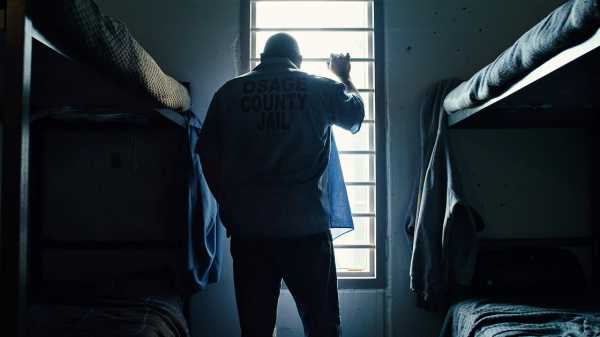
In 2010, the photojournalist Eugene Richards was hired to join the crew of Terrence Malick’s “To the Wonder,” shooting in the town of Bartlesville, in northeastern Oklahoma. In the movie, which was released in 2012, Javier Bardem plays a priest struggling with his faith. Richards—a former photographer for the storied Magnum and VII photo agencies, who has spent his career documenting subjects including poverty, mental illness, and crack-cocaine addiction—was tasked with venturing into the town and finding real residents to interact with Bardem. To locate most of his subjects, Richards got the help of a local Episcopal priest, Father Lee Stephens, who pointed him in the direction of Bartlesville residents and inmates at the nearby prison, in Pawhuska, who had sought his spiritual counsel. Bardem, dressed in his priest garb, sat with them as Richards filmed, and, as Richards puts it, “The basic question of ‘Tell me a little bit about yourself’ grew into something else.” In the end, Malick used only small slivers of the footage in his film. But Richards was so fascinated by the stories he recorded that he petitioned Malick to release the footage to him for his own use.
Bardem smokes a cigarette with Melvin H., an inmate at the Osage County Jail.
The resulting forty-minute film, “Thy Kingdom Come,” which will première at the South by Southwest Film Festival, in March, includes a few heartwarming tales. Bardem speaks with an elderly woman about the key to her happy marriage, and wheels a man out of the confines of his beige nursing home and into the dappled sunlight of a warm spring day. Much of what the townspeople tell Bardem, though, is filled with tragedy and hardship. A tearful mother recounts how, while she was napping once on the couch after a gruelling nightshift, one of her children accidentally drowned. An emaciated woman battling cancer tells Bardem that her son is the only thing keeping her alive. Another woman tells of being gang-raped by men she had considered friends, confiding to Bardem, “I don't think much of myself, and I never have.”
It took Richards years to secure the rights to this footage, but the lag time lends the stories special resonances with the divisions and injustices of today. A former Ku Klux Klan leader tells Bardem about his decision to renounce his racist past. At Osage County Jail, Bardem asks a taciturn black inmate what he should do with his half-smoked cigarette. The inmate replies, “Put it on the floor and stomp it out. That’s what they did to me. Put me on the floor and stomped me out. Just that easy.”
Melvin C., a former Klu Klux Klan leader, at his home in Bartlesville.
The outpouring of devastating memories and heightened emotion can give the viewer a queasy feeling that truth and fiction are joining too seamlessly. Do the interviewees know that their interlocutor is a Hollywood actor and not an emissary of God? Richards says that all were informed that they were participating it a work of fiction, and that Bardem was not a priest. “Most people knew him as the murderer in ‘No Country for Old Men,’ ” Richards said. “A couple people knew him as Penelope Cruz’s husband. Some didn’t know who he was at all. And absolutely no one cared, in the end, who he was, except that he was there to listen.”
Bardem consoles a mother who lost her child in an accidental drowning.
The young parents Adam and Samantha look anxiously toward their future.
Melvin H. in his cell at the Osage County Jail.
Sourse: newyorker.com






